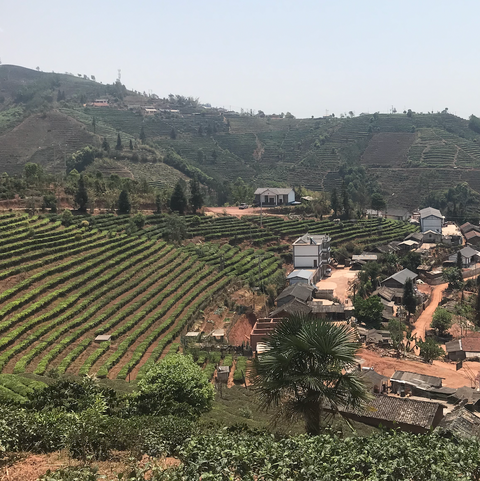
Part 1. The Long Time Coming
Story Johan
Words Harrison
Before anything started with Wesley Andrews—we were lovers of tea. Jared and I were working at Teavana at the time, and were spending a lot of after hours in Verdant Tea, taking in the deep culture that gaiwans and gyokuro held beneath the surface. We’d always had this idea that tea would somehow be a part of where we would go next, but as to what form it would take—we couldn’t have guessed in our dreams.
Ironically, and despite that original vision for the company, it seems to me that when people think of Wesley Andrews, coffee often comes to mind first, and tea second, if indeed it comes at all. This makes sense in my head; it’s a pretty reasonable thing considering the general popularity of coffee in modern America. Tea is typically second fiddle. Not to mention, the name—Wesley Andrews—doesn’t obviously pertain to either tea leaves or coffee beans. When I introduce it to people, the question that comes before either beverage is something along the lines of, “who is this Wesley Andrews character, and how did his name end up on the wall?”
Fair enough.
Originally, we envisioned the company as a purveyor of products that encouraged—or maybe even necessitated—meaningful conversation between its varied partakers. Jared and I were spending a lot of time at a couple spots in Minneapolis for this very reason, and were inspired by the specialty cocktails, the craft tobaccos, cappuccinos, and the like. Among those hideouts was Verdant Tea, the craft tea house I mentioned at the beginning. We coined a term just amongst ourselves—conversation complements—to describe these sorts of things, and we began to get really excited about creating an environment that contributed to this slow subculture. At first we weren’t set on any product in particular, and we didn’t want the name to reflect any one single thing. So instead of calling it something like Java Talk, we became Wesley Andrews—which is just our middle names, but we tried to make it a personification of the conversation complements idea.
Point is: the name doesn’t immediately convey any relation to tea, and that isn’t so bad a thing—it was intentional. We wanted to be able to explore and introduce new things as we developed.

As of 2018, three years had gone by since the shop had opened, and the focus of our development was mostly the coffee journey. We had had an incredible amount of help seemingly come out of nowhere in order to make something of our roastery hopes. That pursuit sort of bound us to the idea of coffee—we had a direct link to it; we felt it becoming a foundational pillar of the Wesley Andrews identity.
Journeying into the tea world was completely different, though. Unlike our coffee experience, there was still a shroud of mystery between us and the tea gardens, and there were large gaps in our understanding of the leaves as a start to-finish product. We just didn’t have a sustainable entry point. The coffee industry was a bit more established, and since beans are roasted differently by each individual roastery, it’s only natural that the final cup’s results are more of a collaboration between farmers and roasters—you’re adding your own art into the mix of it. You are adding your own art into the mix.
There again, tea is trickier—all of its processing is done at or very near the origin; without an in, there was no where we could contribute to the process. And so despite our long-felt love for tea, we were conflicted on how to go about offering it to our friends and neighbors in the cafe. We were absolutely against the idea of upselling—slapping our names on something we’d bought from a huge domestic distributor who’s already selling the same thing to half of the tea shops in town—it’s an unsustainable business practice without room for reciprocity toward the farmers. It’s not good for anybody. Eventually we found a trustworthy partner in Spirit Tea, whose excellent teas filled a need in the cafe for a while; but in time, the desire for a tea connection of our own came creeping back.
What we craved was a personal, reciprocal relationship with tea and the people who were responsible for it, and we weren’t willing to offer anything until we could find it.
One day my mind made itself up. It was December or so, 2018–we were coming off the high of our two-year anniversary, and I was eager to find some new path to explore for the team/as a team. Somehow a sudden thought appeared in my mind and simply wouldn’t let go: get to China, meet farmers, figure it out. Typically I let those weird gut feelings dissipate and wait for something more sensible to come to mind, but something about this felt too important to let go. Nonetheless, I knew I had to act on it, or it would just fade into the back of my mind as something I could’ve done, but didn’t. So in a single week I went through a bit of logic, a lot of passion, and a significant manic episode, until finally Friday came and I was learning Mandarin with a ticket confirmed for Beijing.
Once everything was in motion, all the possibilities began to open up; it was exhilarating. I gave myself 17 days to visit three farms—that was the goal. How that would work was yet a mystery, though, and I’m sure it sounded slightly delusional to the few people I chatted with about it.
That was until I ran into a conversation on accident over the cafe bar. His name was Sam Bydlon, and I stumbled into his acquaintance after noticing a particularly Chinese mannerism of his while offering him coffee. I asked; my instincts were right—he was going to school in Beijing. The world was turning out miraculously small.
I shared the idea with Sam, who said he’d keep an ear out when he returned to China a few weeks later. He wasn’t joking, either—within twenty days he got me in contact with another stranger living in Yunnan Province, one of the major tea regions in the country. He was an owner of a place called Torch Coffee, which was a global effort to develop cafes, tasters, roasters, and farmers in China, all with the hopes of raising the quality of Chinese coffee, and subsequently improving the livelihood of the farmers. It didn’t seem like a tea connection, but I was comfortable enough in the coffee world. It may not have been the destination I intended, but it was a direction, at least, and maybe even the right one—albeit one I couldn’t imagine from where I was in the states. I mean, in just a few weeks we’d found a foothold in Yunnan, of all places, and essentially all I’d done was download Duolingo and be foolish enough to spout some vague dream to a stranger in the cafe. Things come together in strange ways.

Marty moved to China and started Torch. He was extremely kind, and from the start of our interactions he shared my excitement for visiting China. He asked me to visit them in Pu’er, Yunnan, which was about 1,900 miles from Beijing. The trip hadn’t even begun and it was already a long one. And to add yet another link onto the ever-lengthening telephone chain, Marty mentioned a new contact of his—a native of the region he’d met in a Q-Grader Calibration course. His English name was Peter, and that was really all I knew before texting him. But anything new was a potential lead, so I sent a message into the unknown void. The response was short, and extremely to the point—it was a little jarring. I didn’t know if the culture of communication was just different between us, or if this guy was living in a world way over my head. Most intimidating is if it was both.
“When you come to China, meet me in Dalian. We can have dinner together. Talk tea.”
I just started packing. The miles of winding path were rising and rising, but what else was there to do? Whatever was waiting for me on the other side of the world was seeming more and more meant to be. Doors were opening, but walking through them was going to be more and more of a challenge. Next to what was to come, getting the invitation was simple. Tackling travel and communication in China would be a whole new beast, and I would need help. And, as it turned out, this willingness to go in blind and accept whatever aid came along the way was the only real requisite to opening the doors to the tea world wide open.

